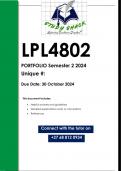LPL4802
PORTFOLIO Semester 2 2024
Unique #:
Due Date: 30 October 2024
This document includes:
Helpful answers and guidelines
Detailed explanations and/ or calculations
References
Connect with the tutor on
+27 68 812 0934
,© Study Shack 2024. All rights Reserved +27 68 812 0934
, QUESTION 1 (ESSAY) NATURE AND ASSESSMENT OF NON-
PATRIMONIAL LOSS AND DAMAGES FOR PATRIMONIAL LOSS
1.1.
To succeed in a claim for emotional shock, or psychiatric injury, under South
African law, certain elements must be proven by the plaintiff. These elements
are closely linked to the general principles of delictual liability and have been
shaped by both common law and judicial precedent. A delict is a civil wrong
that results in harm or loss, and to claim successfully, all five elements of a
delict must be present: conduct, wrongfulness, fault, causation, and harm or
loss. In the context of emotional shock, these elements are particularly
scrutinized. Below is a discussion of what the plaintiff must prove to succeed
in such a claim, with reference to the case of Komape and Others v Minister of
Basic Education and Others [2020 (2) SA 347 (SCA)] and other relevant
authorities.
1. Conduct
The first requirement is the defendant’s conduct. This refers to any act or
omission by the defendant that causes the harm suffered by the plaintiff. In
cases of emotional shock, the plaintiff must demonstrate that the defendant’s
conduct was the cause of their emotional distress. This can occur when the
plaintiff witnesses or hears of a distressing event, such as the death or injury
of a close relative. In the Komape case, the plaintiffs witnessed the aftermath
of their son’s tragic death when he drowned in a pit latrine at school. The
school's and government authorities' failure to ensure proper and safe
sanitation facilities amounted to the harmful conduct leading to the emotional
shock suffered by the plaintiffs(Reported case law).
2. Wrongfulness
Wrongfulness in delict refers to the breach of a legal duty not to cause harm.
In cases of emotional shock, the plaintiff must show that the defendant’s
conduct was wrongful, i.e., that the conduct was unreasonable and violated a
duty of care. The duty of care is often determined by the foreseeability of
harm. In the Komape case, the court had to consider whether the school
© Study Shack 2024. All rights Reserved +27 68 812 0934




